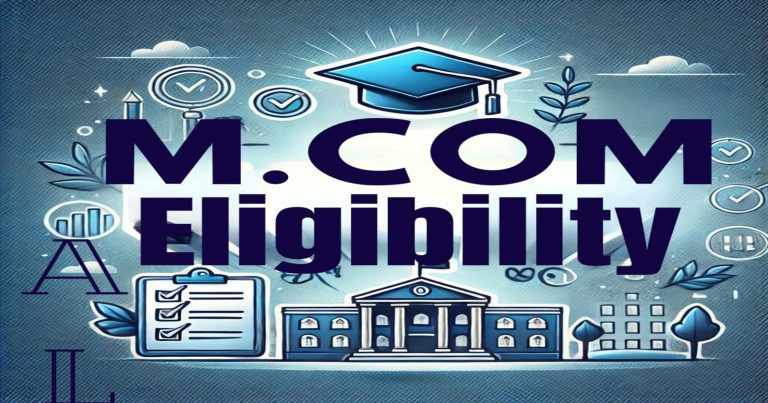M Com, or Master of Commerce, is one of the most sought-after postgraduate courses for commerce students. It builds expertise in advanced areas of accounting, finance, taxation, and business management. Students have to fulfill specific M Com eligibility criteria set by different universities to join this course. Knowing the criteria will help you qualify for admission and ensure a smooth application process.
What Is M Com?
Master of Commerce is a postgraduate degree that expands one’s knowledge in commerce-related areas. It is a great course for those seeking experience in finance, accounting, business management, and economic policies. It’s a program specifically designed for commerce graduates who wish to expand their qualifications and grow into management positions in high-level organizations.
M Com teaches not only concepts but also includes practical applications of the same. The students develop skills to encounter complex problems in a real-world business environment. Be it a financial model business strategy or tax planning, M Com graduates are up for the cut in various walks of life.
The course specializations include a variety of those:
- Accounting and Finance– For students planning to become analysts, accountants, or auditors.
- Economics – A course for market dynamics and other economic principles
- Taxation – Best course for those to become tax consultants or tax experts
- Business Analytics – This stream is data-oriented and based on decision-making criteria for business
Through this course, the student shall be prepared at all levels for assuming leadership positions within their respective lines of work.
M Com Course Details
The M Com course details the structure and course duration, in addition to all the specializations and learning outcomes of the program. Designed as a postgraduate degree with an in-depth understanding of all commerce-related things, this preparation equips its students with opportunities in various other careers.
M Com Full Form
MCom or Master of Commerce is a Full Form. This postgraduate degree course takes two years; it is an advanced study in commerce and its related fields. It is a progression of the foundational principles delivered at the undergraduate level. The program is well-recognized and offers an excellent academic foundation for finance, banking, taxation, or higher education careers.
It is internationally recognized and, therefore, highly suitable for a person looking for a career in a multinational corporation or abroad. In this manner, you can gain proper insight into the course and relevance of such a postgraduate degree by knowing the complete form and meaning of the term. General Details About M Com
| Aspect | Details |
| Degree Name | Master of Commerce (M Com) |
| Duration | 2 years (4 semesters) |
| Eligibility | Bachelor’s degree in commerce or equivalent |
| Specializations | Accounting, Finance, Economics, Taxation, Business Analytics |
| Mode | Regular or Distance Learning |
| M Com Fees | ₹10,000 to ₹1,50,000 (varies by institution) |
Key Features of M Com Program
- In-depth Knowledge: This course deals with advanced topics, such as international trade, financial management, and business policy.
- Practical Exposure: Most of the Universities include internships, live projects, and case studies for practical exposure.
- Research work: Students are encouraged to research areas such as taxation, auditing, and investment strategies.
- Specializations: The M Com program provides a list of specializations that help the student align to the career.
M Com students have theoretical insights plus problem-solving skills on practical lines, which can make this degree very versatile and worthwhile.
General M Com Eligibility Criteria
While the specific criteria might vary for different institutions, most universities maintain standard eligibility criteria. So, here are the most frequently occurring requirements:
1. Qualifying Educational Degree
To enter an M Com course, candidates must hold an undergraduate degree in the relevant subject area. That includes:
- B Com: Generally, most colleges demand a B Com degree because such a course teaches basic knowledge in commerce subjects.
- Other Equivalents: Apart from the B Com qualification, BA in Economics, BBA (Bachelor of Business Administration) or BBM (Bachelor of Business Management), etc., could also be used for eligibility to the M Com course. This covers all the topics studied in economics, management, and accounting.
However, some universities only admit commerce graduates. Please ensure to check the university’s requirements for your application.
2. Percentage Cut Offs
Many universities demand a candidate to achieve a minimum percentage in their graduation degree.
- General Guidelines: The candidates are expected to have achieved 50-55% marks in graduation.
- Relaxation for Reserved Categories: Universities relax the minimum percentage requirement for candidates from reserved categories, like SC/ST or OBC students. The percentage of relaxation varies institution-wise and according to government policies.
Take, for instance, a university that has eligibility criteria of 55%. Then SC/ST or OBC students are eligible with 50% marks.
3. Requirement of Entrance Examination
Some colleges and universities demand that applicants qualify for an entrance exam to gain admission into their M Com program. The entrance exams analyze the candidate’s knowledge in commerce, finance, and other related fields.
- Most sought Entrance Exams: Common entrance exams for M Com are DUET (Delhi University Entrance Test), BHU PET (Banaras Hindu University Postgraduate Entrance Test), and PU CET (Panjab University Common Entrance Test).
- Exam Structure: These tests generally consist of multiple-choice questions covering accounting, business studies, economics, and general aptitude.
- Merit-Based Admission: In contrast, many universities offer merit-based admission, where candidates are selected based on their undergraduate marks without an entrance test.
Whether you need to take an entrance exam or not depends on the university’s specific admission process.
Examples of University-Specific M com Eligibility
To understand eligibility criteria better, let’s try to understand the requirements for two famous universities:
1. IGNOU M Com Admission Eligibility
The M Com program provided by the Indira Gandhi National Open University is also open to many candidates. The Eligibility criteria by IGNOU M com are as below:
- Educational Qualification: Passed Bachelor’s Degree in any Discipline from a Recognized University/College.
- No Entrance Exam: IGNOU does not have an entrance exam for M Com admission, thus it is pretty easy for the students.
- Eligibility Criteria are quite relaxed: As IGNOU takes every student who has an academic background, even the student who does not come from a commerce background also can apply for the M Com course.
IGNOU’s distance education model makes it apt for working people or students who need flexible study time.
2. Eligibility for M Com at DU (Delhi University)
Considered to be one of the leading academic institutions in India, Delhi University M Com course attracts very stiff competition. The eligibility criteria for DU are given below Eligibility for DU.
- Qualification Education: Aspirants need to have at least a B Com degree or equivalent qualification with any commerce-based subjects.
- Minimum Percentage: General candidates must have scored at least 55% marks, whereas candidates in the reserved category may also apply with 50% marks.
- Admission Mode: DU offers merit-based and entrance-based admissions. For merit-based admission, the candidate must have completed his undergraduate degree from Delhi University itself. External applicants are required to take the DUET entrance examination to secure a seat.
This rigorous admission process indicates the high standard of academic reputation that DU enjoys.
M Com Admission Process
M Com admission process is different from institute to institute. Some colleges follow merit-based admissions, while others conduct entrance exams to evaluate a candidate’s feasibility. In the following steps, we have mentioned all the procedures required to get admitted into the program: Step-by-Step Admission Process.
Application Form
The application form is available on the university’s official website or in offline mode. Fill it up with all the accurate details about your academic qualifications and personal information.
Entrance Exams (if applicable)
Some universities, like BHU and Delhi University, conduct entrance exams to test a candidate’s knowledge of commerce subjects. The entrance exam usually includes accounting, economics, finance, and general aptitude sections.
A list of shortlisted candidates is prepared for universities following a merit-based system based on their undergraduate marks.
Counseling or Interview
In some institutions, students are made to attend a counselling session or interview as part of the selection process.
Document Verification
All the required documents, such as academic transcripts, ID proof, and entrance exam scorecards (if applicable), must be submitted.
Fee Payment
After verification, candidates must pay the admission fee to confirm their seat in the program. The admission process for distance education programs like IGNOU is relatively easier. Students must submit their application form and pay the required fee directly, provided they meet the eligibility criteria.
Documents Required for M Com Admission
To complete your M Com admission, you must submit the following documents:
- Mark Sheets: Original and photocopies of your undergraduate degree and 12th-grade mark sheets.
- Degree Certificate: A certificate proving you have completed your bachelor’s degree from a recognized university.
- Entrance Exam Scorecard: If applicable, provide the scorecard for the entrance exam.
Identity Proof: Aadhaar card, PAN card, or any government-issued ID.
- Photographs: Recent passport-sized photographs as per the university’s specifications.
- Migration Certificate: Required for students changing universities or education boards.
Ensure you have the original and photocopy of these documents. Without these, admission will be delayed.
M Com Syllabus
M Com syllabus is so constructed that it teaches all the aspects of commerce and business practices. Every semester covers core subjects as well as electives. The syllabus thus offers theoretical as well as practical learning. Key Contents of the Syllabus
- The fundamental topics are usually finance management, economics, and auditing, which are compulsorily there.
- Students can choose their career choices, such as international trade or financial planning.
- Projects and Research: A lot of research work is there in this syllabus. Many universities in their respective countries demand that students do a dissertation or project work during the final semester. The syllabus also changes with the latest business practices that make students industry-relevant.
Career Scope after M Com
The career scope after M Com is humongous and diverse. Students can choose their career in any of the above fields such as accounting, finance, banking, taxation, or even as an academician.Most in-demand career options are:-
Accounting and Auditing
The demand for accountants and auditors is huge post-M Com. Organizations recruit M Com students to prepare their organization’s financial statements and audit them in compliance with tax issues.
Banking and Finance
The students can find jobs as financial analysts, credit analysts, or investment bankers in reputable financial institutions.
Teaching and Research
M Com is a stepping stone for those wishing to become lecturers or professors. Many also do it for academic positions.
Corporate Sector
Most M Com graduates receive employment opportunities in management, operations, or marketing in multinational companies.
Government Jobs
There are opportunities in the public sector banks, tax departments, and other regulatory bodies like SEBI and RBI. This course also leads to professional certifications like CA, CFA, or CMA, thus opening the doors to international career opportunities.
M com Eligibility FAQs
1. What are the M Com Eligibility criteria?
In M Com, one must be eligible for any degree in commerce or equivalent with more than 50-55% marks.
2 . What are the IGNOU M Com Eligibility criteria?
In IGNOU, one needs a bachelor’s degree for M Com eligibility. There is no entrance exam conducted to get into the institute.
3. Is there any entrance exam compulsory in M Com?
Not all universities have an entrance exam. Many of them are merit-based.
4. What are the career prospects after M Com?
Accountancy, Finance, Banking, Taxation, etc. they can opt for teaching careers in colleges or universities; Professional Certifications
5. What documents would be required for taking admissions in M Com?
Undergraduate mark sheets, Undergraduate degree certificates, Identity proof, and Entrance exam scorecards.


